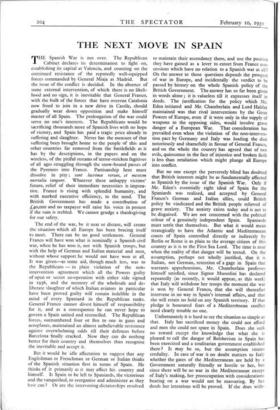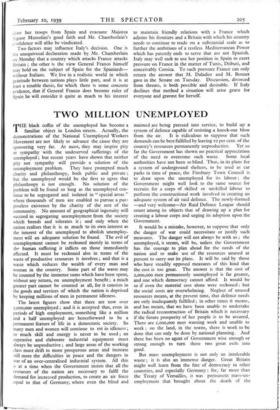THE NEXT MOVE IN SPAIN
THE Spanish War is not over. The Republican Cabinet declares its determination to fight on, establishing its capital at Valencia, and counting on the continued resistance of the reputedly well-equipped forces commanded by General Miaja at Madrid. But the issue of the conflict is decided. In the absence of some external intervention, of which there is no likeli- hood and no sign, it is inevitable that General Franco, with the bulk of the forces that have overrun Catalonia now freed to join in a new drive in Castile, should gradually wear down opposition and make himself master of all Spain. The prolongation of the war could serve no one's interests. The Republicans would be sacrificing thousands more of Spanish lives with no hope of victory, and Spain has paid a tragic price already in suffering and slaughter. Never has the measure of that suffering been brought home to the people of this and other countries far removed from the battlefields as it has by the descriptions, in the papers and on the wireless, of the pitiful streams of terror-stricken fugitives of all ages struggling through the snow-bound passes of the Pyrenees into France. Partisanship here must dissolve in pity ; sunt lacrinzce rerun, et mentem mortalia tangunt. Whatever these unhappy victims' future, relief of their immediate necessities is impera- tive. France is rising with splendid humanity, and with marked executive efficiency, to the need. The British Government has made a contribution of £40,000 and no taxpayer will raise his voice in protest if the sum is trebled. We cannot grudge a thanksgiving for our safety.
The end of the war, be it near or distant, will create the situation which all Europe has been bracing itself to meet. There can be no good settlement. General Franco will have won what is nominally a Spanish civil war, when he has won it, not with Spanish troops, but with the help of German and Italian material and men, without whose support he would not have won at all. It was given—as some aid, though much less, was to the Republicans — in plain violation of the non- intervention agreement which all the Powers guilty of open or secret co-operation with either side signed in 1936, and the memory of the wholesale and de- liberate slaughter of which Italian aviators in particular have been proved guilty will remain indelible in the mind of every Spaniard in the Republican ranks. General Franco cannot divest himself of responsibility for it, and as a consequence he can never hope to govern a Spain united and reconciled. The Republican forces, outnumbered four or five to one in guns and aeroplanes, maintained an almost unbelievable resistance against overwhelming odds till their defences before Barcelona finally cracked. Now they can do nothing better for their country and themselves than recognise the inevitable and accept it.
But it would be idle affectation to suggest that any Englishman or Frenchman or German or Italian thinks of the Spanish situation first in terms of Spain. He thinks of it primarily as it may affect his country and himself. Is Spain to be left to Spaniards, the victorious and the vanquished, to reorganise and administer as they best can ? Or are the intervening dictatorships resolved to maintain their ascendancy there, and use the position they have gained as a lever to extort from France con- cessions which have no relation to a Spanish war at all? On the answer to those questions depends the prospect of war in Europe, and incidentally the verdict to be passed by history on the whole Spanish policy of the British Government. The answer has so far been given in words alone ; it is valueless till it expresses itself in deeds. The justification for the policy which Mr. Eden initiated and Mr. Chamberlain and Lord Halifax maintained was that rival interventions by the Great Powers of Europe, even if it were only in the supply of weapons to the opposing sides, would involve grave danger of a European War. That consideration has prevailed even when the violation of the non-interven- tion pact by Germany and Italy was loading the dice notoriously and shamefully in favour of General Franco, and on the whole the country has agreed that of two evils, quiescence in the face of injustice and broken faith is less than retaliation which might plunge all Europe into conflict.
But no one except the perversely blind has doubted that British interests might be as fundamentally affected as Spanish by the issue of the Spanish War. Only if Mr. Eden's essentially right ideal of Spain for the Spaniards was realised, and accepted by General Franco's German and Italian allies, could British policy be vindicated and the British people relieved of grave anxiety. The anxiety exists today and is not to be disguised. We are not concerned with the political colour of a genuinely independent Spain. Spaniards must settle that themselves. But what it would mean strategically to have the Atlantic and Mediterranean coasts of Spain controlled directly or indirectly by Berlin or Rome is as plain to the average citizen of this country as it is to the First Sea Lord. The time is near when the reality of that danger will be tested. On the assumption, perhaps not wholly justified, that it is Italian, not German, retention of a gage in Spain that warrants apprehensions, Mr. Chamberlain professes himself satisfied, since Signor Mussolini has declared repeatedly (as recently, it would appear, as this week) that Italy will withdraw her troops the moment the war is won by General Franco, that she will thereafter intervene in no way in Spain's internal affairs, and that she will retain no hold on any Spanish territory. If that pledge is honoured fears of a Mediterrtnean conflict need clearly trouble no one.
Unfortunately it is hard to see the situation so simple as that. Italy has sacrificed money she could not afford and men she could not spare in Spain. Does she seek no reward except the knowledge that what she is pleased to call the danger of Bolshevism in Spain has been exorcized and a totalitarian government established there? It may be so, but the assumption strains credulity. In case of war it no doubt matters to Italy whether the gates of the Mediterranean are held by a Government naturally friendly or hostile to her, but since there will be no war in the Mediterranean except of Italy's making, her preoccupation with considerations bearing on a war would not be reassuring. By her deeds her intentions will be proved. If she does with- draw her troops from Spain and evacuate Majorca Signor Mussolini's good faith and Mr. Chamberlain's confidence will alike be vindicated.
Two factors may influence Italy's decision. One is the unequivocal declaration made by Mr. Chamberlain on Monday that a country which attacks France attacks Britain ; the other is the view General Franco himself may hold on the subject of Spain for the Spaniards— without Italians. We live in a realistic world in which gratitude between nations plays little part, and it is at least a tenable thesis, for which there is some concrete evidence, that if General Franco does become ruler of Spain he will consider it quite as much to his interest to maintain friendly relations with a France which adjoins his frontiers and a Britain with which his country needs to continue to trade on a substantial scale as to further the ambitions of a restless Mediterranean Power which has patently ends to serve that are not Spanish. Italy may well seek to use her position in Spain to exert pressure on France in the matter of Tunis, Djibuti, and conceivably Corsica. To such pressure France can only return the answer that M. Daladier and M. Bonnet gave in the Senate on Tuesday. Discussion, divorced from threats, is both possible and desirable. If Italy declines that method a situation will arise grave for everyone and gravest for herself.















































 Previous page
Previous page